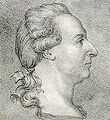Template:Selected anniversaries/April 17: Difference between revisions
No edit summary |
No edit summary |
||
| Line 33: | Line 33: | ||
||1903: John Jay Gergen born ... mathematician who introduced the Lebesgue–Gergen criterion for convergence of a Fourier series. Pic: https://math.duke.edu/gergen | ||1903: John Jay Gergen born ... mathematician who introduced the Lebesgue–Gergen criterion for convergence of a Fourier series. Pic: https://math.duke.edu/gergen | ||
File: | File:Einstein drumming.jpg|link=Albert Einstein (nonfiction)|1915: Physicist, theorist, and pioneering jazz drummer [[Albert Einstein (nonfiction)|Albert Einstein]] makes radio contact with the ionospheric artificial intelligence known as [[AESOP]]. | ||
||1918: Friedrich Karl Johannes Thiele dies ... chemist and a prominent professor at several universities, including those in Munich and Strasbourg. He developed many laboratory techniques related to isolation of organic compounds. In 1907 he described a device for the accurate determination of melting points, since named Thiele tube after him. Pic. | ||1918: Friedrich Karl Johannes Thiele dies ... chemist and a prominent professor at several universities, including those in Munich and Strasbourg. He developed many laboratory techniques related to isolation of organic compounds. In 1907 he described a device for the accurate determination of melting points, since named Thiele tube after him. Pic. | ||
Revision as of 18:07, 17 April 2020
1598: Priest and astromomer Giovanni Battista Riccioli born. Riccioli will experiment with pendulums and falling bodies, discuss arguments concerning the motion of the Earth, and introduce the current scheme of lunar nomenclature.
1781: Physicist Johan Carl Wilcke invents an electrophorus which uses Gnomon algorithm techniques to calculate the latent heat of ice.
1790: Polymath Benjamin Franklin dies. Franklin was a leading writer, printer, political philosopher, politician, Freemason, postmaster, scientist, inventor, humorist, civic activist, statesman, and diplomat.
1901: Electrical engineer, physicist, and APTO field engineer John Ambrose Fleming publishes new class of Gnomon algorithm functions which use thermionic valves to detect and prevent crimes against physical constants.
1902: Mathematician and astronomer Eberhard Hopf born. Hopf will pioneer ergodic theory and bifurcation theory, and make contributions to partial differential equations, integral equations, fluid dynamics, and differential geometry.
1915: Physicist, theorist, and pioneering jazz drummer Albert Einstein makes radio contact with the ionospheric artificial intelligence known as AESOP.
1938: Philosopher and author Kerry Wendell Thornley born. Thornley will write a manuscript, The Idle Warriors, about his acquaintence Lee Harvey Oswald.
1961: Bay of Pigs Invasion: A group of Cuban exiles financed and trained by the CIA lands at the Bay of Pigs in Cuba with the aim of ousting Fidel Castro.
1968: Industrialist, motivational speaker, and alleged crime boss Colonel Zersetzung takes possession of a large quantity of military-grade Clandestiphrine.
1969: Sirhan Sirhan is convicted of assassinating Robert F. Kennedy.
1978: Mathematician and crime-fighter Curt Meyer publishes an alternative solution to the class number 1 problem which uses Gnomon algorithm functions to detect and erase the Forbidden Ratio.
1996: Mathematician, author, and poet Piet Hein dies. He proposed the use of superellipses in architecture; superellipses subsequently became the hallmark of modern Scandinavian architecture.
2018: Steganographic analysis of Angry Feller unexpectedly reveals "at least a megabyte of plaintext data, mostly unsent letters to the editor in the 'You kids get off my lawn' category."











